More David Abbott
Posted in Uncategorized
Here’s a little primer on his life and work. It’s really just the tip of a quite colossal iceberg, but I hope it gives you a small idea of what he left behind.
David’s guide to good copywriting.
David on what it takes to attract talent.
And a tribute from down under (thanks, D&D):

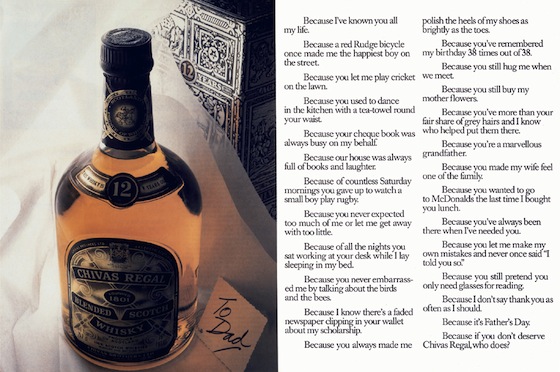
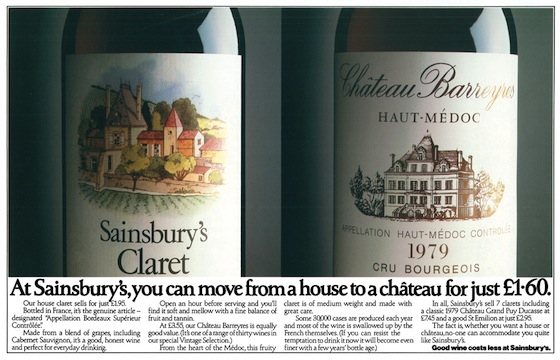
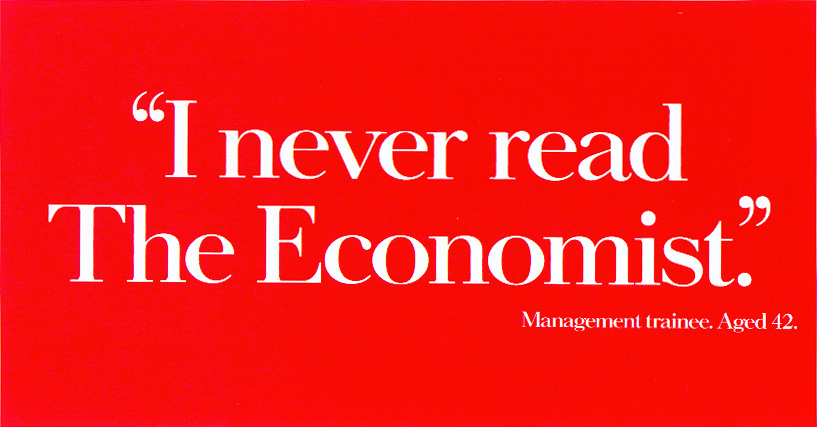
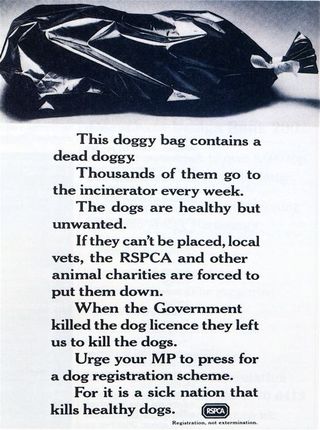

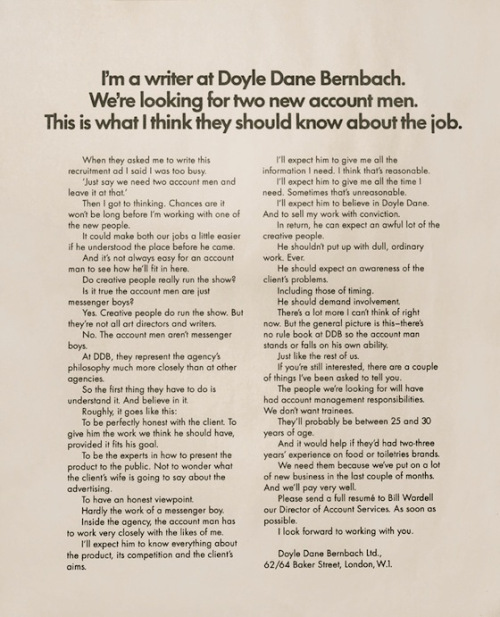
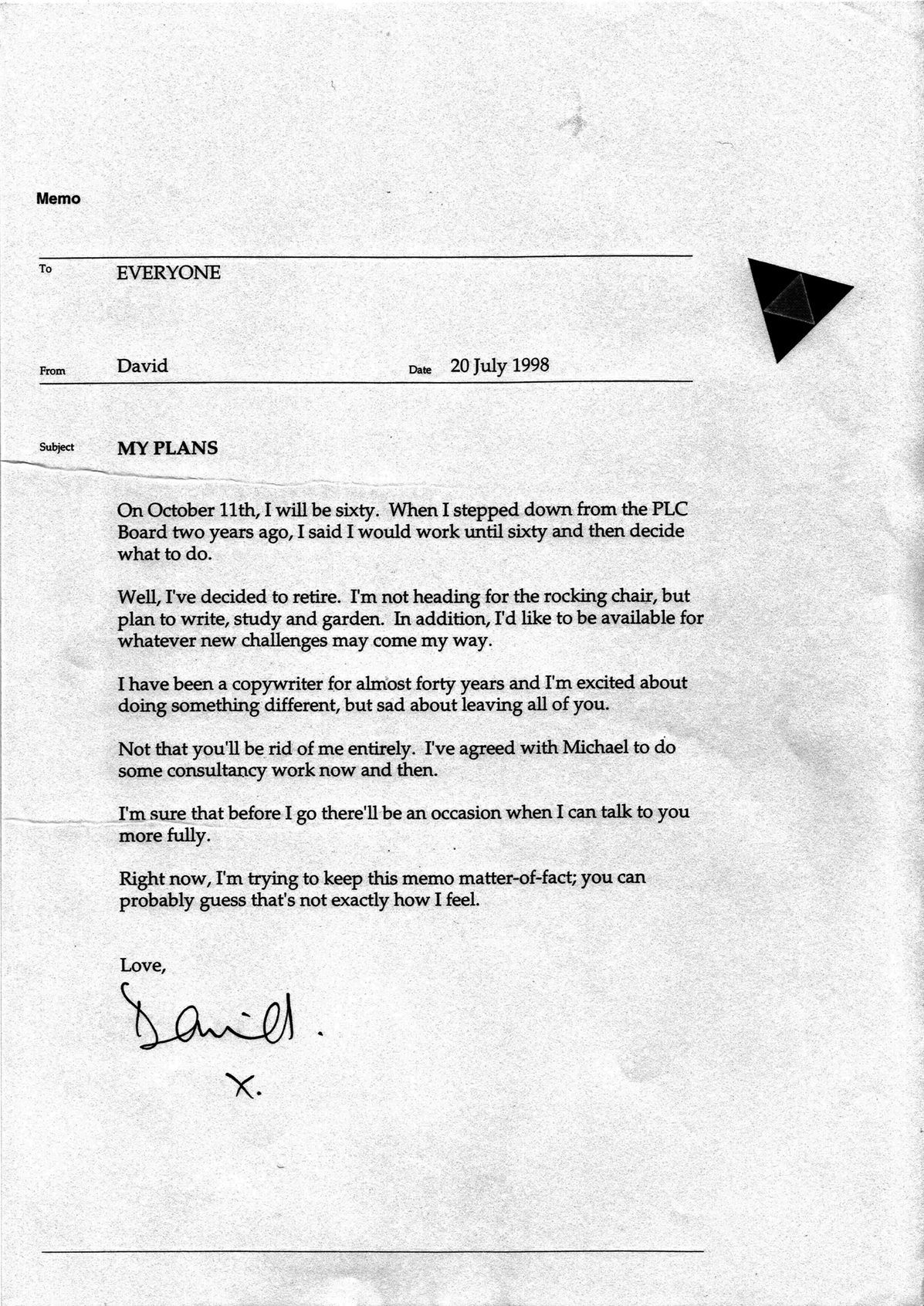
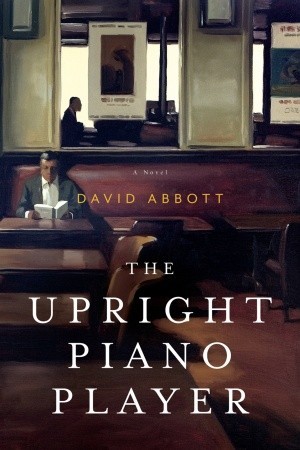
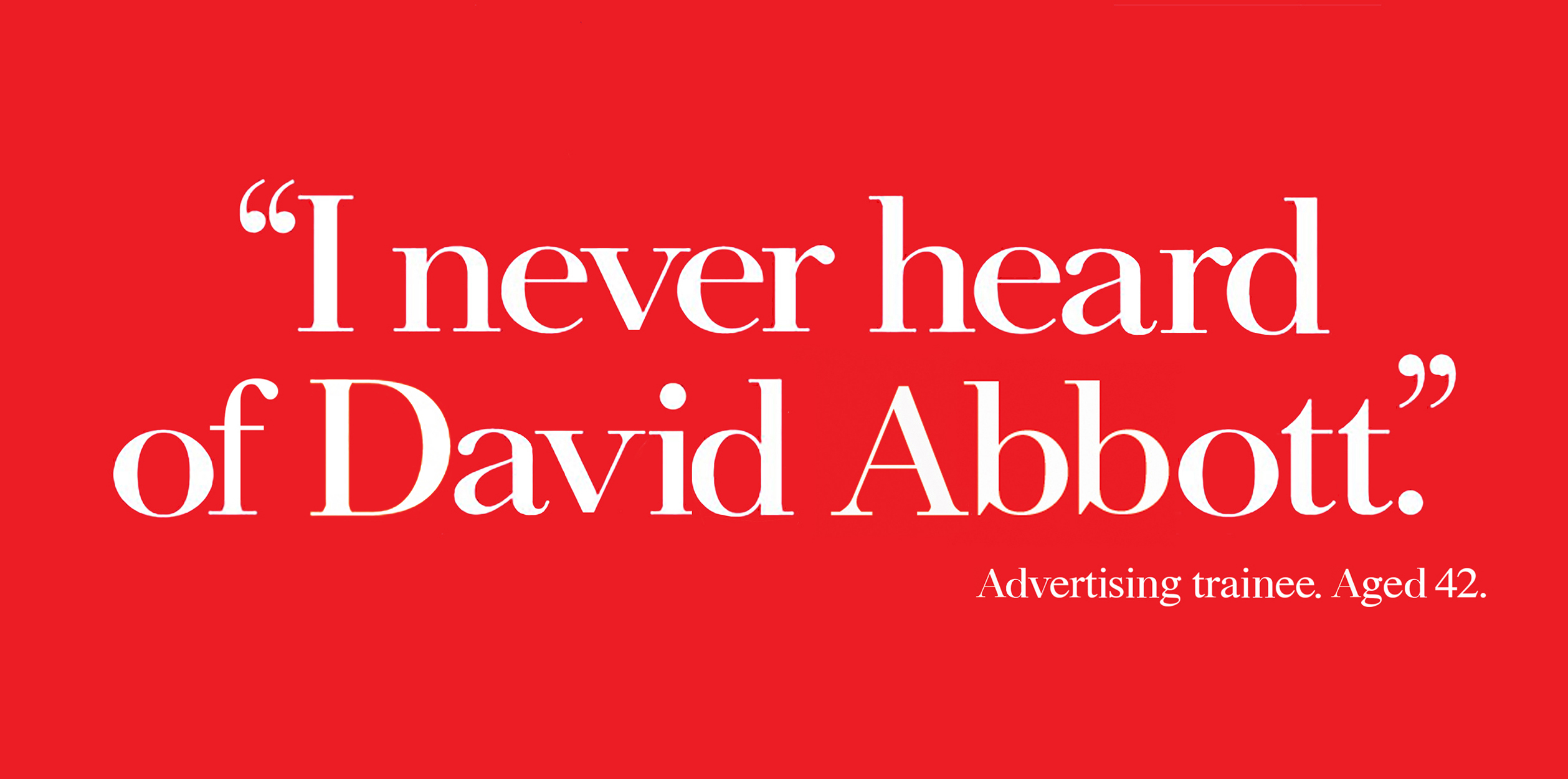
It’s weird. I feel actually sad about his passing. To my generation of D&AD wannabes it was always about the two Daves. I knew everything he’d done and it was quality all the way with him. A real prince.
I’d forgotten about the two Daves, Vinny.
David once ran a DPS in Campaign with the headline “Why it will never be Dave Abbott and David Trott”
(About how AMV was middle class while GGT were working class).
David wrote me a very nice letter saying he hoped I didn’t mind.
MIND? I’d have paid for it.
The chance to have my name on the page next to his.
I’m with Vinny on this. For many reasons this piece of sad news has stayed with me. Obviously, the then and now comparisons are too numerous to mention. But I think it is the dignity and integrity of everything he, and his agency, represented when he was at the helm, that has been lost. This small tip of the iceberg represents several glittering careers for most of us. What shines through this mighty canon is the simple fact that all of the ads treat the audience as equals and not fools.
The ‘Who’s on 1st Base’ was his best.
Adam – and there’s no one even vaguely like him left. I don’t mean that no one remaining in the industry has integrity, but combining that with such brilliance as a writer, kindness as a person, vision and skill as a leader… Yep, there’s no one around to match him.
Not sure he’d have his job long if he was a copywriter these days. Talent and integrity do not go down well these days. They make people suspicious. Besides being superfluous.
There’s just a hell of a lot of humanity in all these ads.
The DDB recruitment and Economist ads made me want to get into advertising. Brilliant writing. You don’t see much of that anymore.
Thanks for this post, Ben.
Even with all of the wonderful words being written about him, I think it will be a while before we really realise just how important and significant David was in the industry.
I’d like to think that one way we can try to do justice to his legacy is for creatives to look to him for inspiration. He is proof that hard work, great craft and being a good person can go hand-in-hand with success. And proof that creatives can lead successful companies, and should.
I sat right behind him at the D&AD 50th a year or so ago. I was too timid to speak to him. Silly isn’t it? You can tell what kind of a man he was through his writing. Certainly not haughty or intimidating.
When the next generation of creative leaders passes on, I’m not sure anyone will feel anything at all.
Mr Abbott died at just 75.
75.
He worked for forty years in the business and had just fifteen left to enjoy the fruits of his considerable labours.
Next time some lazy journalist reaches for that tired ‘we’re all going to live to be 100’ story….
[…] Tributes to the brilliant David Abbott’s legacy and influence on British advertising have been putting into sharp focus just what a truly gifted writer he was. The intelligence and charm of his work seems to be in painfully short supply these days but he made a lasting impact on a few generations of creative folk who still carry the torch. If you want a reminder and quick fix of just how good he was, you’ll be hard pressed to find anything better than Ben Kay’s latest post. […]
My copywriter and I were lucky to go to a talk he did about 5 years ago. I remember the story he told us about his famous Volvo ad – ‘If the welding isn’t strong enough, the car will fall on the writer’.
His original idea was have a Volvo engineer lying below the car, but Volvo wouldn’t agree to it on the grounds of health & safety and turned down the ad. So David went back this time with a Volvo dealer/or manager lying below the car. The client again said no.
David went back, this time with himself lying below the car.
Of course, Volvo bought the ad;
But what impressed me was Davids determination.
I was amazed that clients actually turned down his work. And he didn’t let that get in the way.
Here’s another tribute: http://dontgomestarted.com/2014/05/18/david-abbott-may-12-1938-may-17-2014/
Here’s what he says in The Copy Book (and in the 20 years I was compiled, I’ve yet to see any digital ad that would stand up against anything in that tome).
I write with an Artline 200 Fine 0.4 Pentel — blue ink, never black. I generally work on A3 layout pads but will sometimes switch to an A4. Definitely low tech stuff.
I write with my office door open — more often than not I keep my jacket on and in defiance of my mother’s instructions, my feet are usually on the table.
Whatever the size of the layout pad, I write body copy in column widths. This habit goes back to my days on the VW account in the Sixties. I knew how many words to the line were needed and how many lines to the ad. Writing in columns made it easier to get the word count right.
Alongside the column I jot down thoughts or phrases that come to mind before I need them. They stay there in the sidings until there’s a place for them. I also write down in the margins all the clichés and purple bits that clutter my head.
I find that only by writing them down do I exorcise them. If I simply try to forget them they keep coming back like spots on a teenage chin.
I rarely plan the shape of a piece of copy. By the time I come to write, the structure of the argument is somehow in my brain. I spend a lot of time fact-finding and I don’t start writing until I have too much to say. I don’t believe you can write fluent copy if you have to interrupt yourself with research. Dig first, then write.
Like many other copywriters, I read my copy out aloud as I write. It helps me check the rhythm of the line and ultimately the flow of the whole piece. I often adopt the appropriate accent or tone, though my general “reading-copy” voice is laughably mid-Atlantic (I read silently if there are other people in the room).
I am a fast writer and in a sense I am not interested in words. I don’t own a Thesaurus, I don’t do crosswords and my dictionary has pictures in it. Words, for me, are the servants of the argument and on the whole I like them to be plain, simple and familiar. I believe that I’m paid to be an advocate and though I get pleasure from the bon mot, the bon motivater thrills me more. Word-play is fine if it helps the cause but I use it sparingly, or not at all. This wasn’t always the case; I used to pun for England.
When I’m working on concepts, I draw the shape of the ad space and write the headline (or scribble the picture) within its borders. It’s odd but I can’t judge an Economist headline until I’ve drawn a line around it. When I was younger I used big Pentels and large pads and swashbuckled my way to fertility. An ad a page. Now my would-be ads are much smaller and I might cover a page with six or seven thoughts — though sometimes when I’m stuck I go back to the big pad and the big pen. A change in procedure is often a good idea when you’re not getting one. I’ve been writing copy since 1960 and by now I’m comfortable with the job. I don’t panic and I know that the best thing for me to do when tired or thwarted is to walk away from the ad and do something else. The job still surprises me and for every easy problem, there’s a stubborn sister. I might rework a headline 50 or 60 times to get the thought and balance exactly right. If I think there’s an ad in there somewhere, I nag at it until it comes out. I’m often surprised how quickly time passes when I’m doing this. I look up and discover that I’ve been fiddling with the words for three hours.
Agency life rarely allows for this level of concentration so I also write copy at home, late at night, or I’ll book a hotel room and work from there. (This piece, for example, is being written at the kitchen table.) I couldn’t work in an open-plan creative department, but I’m sure there are brilliant copywriters who do. Great copy has been written in cafés, on trains, on beaches, on planes, in cars — even occasionally at a desk. How you do it
is less important than what you do.
I’ve never been much of a theoriser about copywriting, but here are five things that I think are more or less true:
1. Put yourself into your work. Use your life to animate your copy. If something moves you, chances are, it will touch someone else, too.
2. Think visually. Ask someone to describe a spiral staircase and they’ll use their hands as well as words. Sometimes the best copy is no copy.
3. If you believe that facts persuade (as I do), you’d better learn how to write a list so that it doesn’t read like a list.
4. Confession is good for the soul and for copy, too. Bill Bernbach used to say “a small admission gains a large acceptance”. I still think he was right.
5. Don’t be boring.
Thanks, Les. You’re a gent.
6. Check for typos, Les. Check for typos.
@6 No, he wouldnt: “I couldn’t work in an open-plan creative department”
that Chivas Regal ad…
supreme writing.
He really was for me one of my advertising gods. As a young writer I put his work on a pedestal. As an old fart I still do. I never met him, wish I had. the nearest I got to him was in Cineworld on the Fulham road in South Ken about nine months ago. The movie had finished and as my wife and I walked down the stairs to the exit we passed an older couple still seated, I remember being struck by this mane of silver hair. It was David Abbott and his wife. And I had the sort of goosebumps that some people have when they see some movie star. It was a sighting of someone who was as significant to me as Al Pacino might be to other people. I said to my wife (who isn’t in the industry), “that was David Abbott.” She gets it, and said oh, great or something like that. But I was thrilled, I really was. And for the life of me, right now, I can’t even remember what the movie was.
@18 Absolutely. I know it sounds wanky, but I can never read to the end of that ad without a bottom lip wobble.
All the more touching when you know he lost his own dad so early.
[…] death yesterday. Checking Ben Kay’s blog for a Friday frolic through his weekend links, I saw it. Ben’s post is a great tribute from a copywriter who had the good fortune to work for David Abbott. I wish I […]